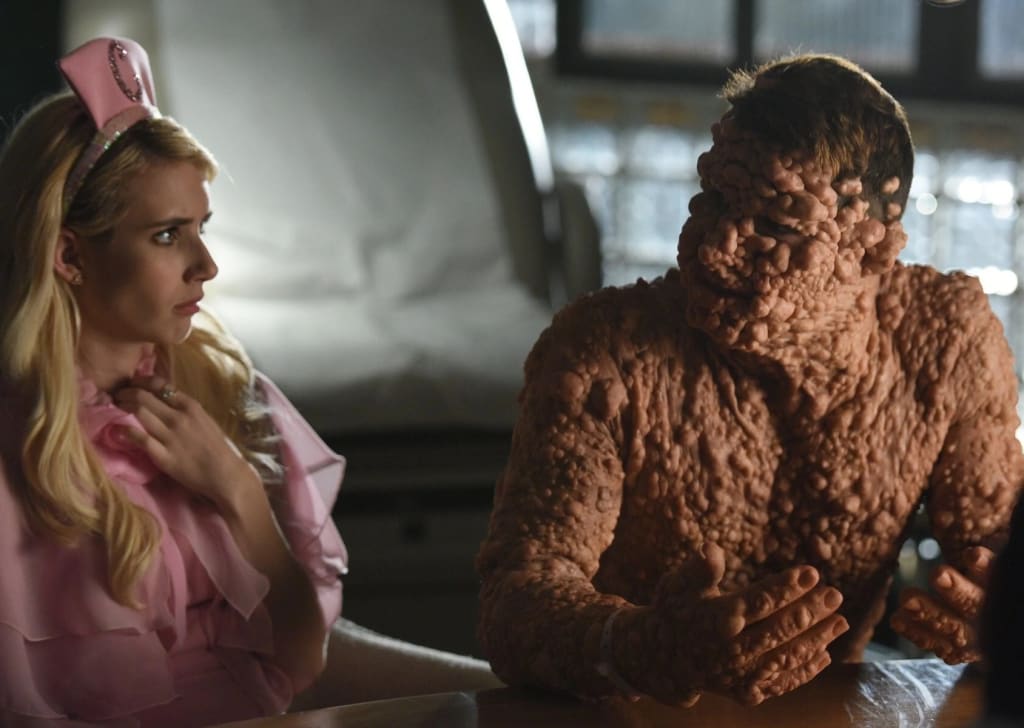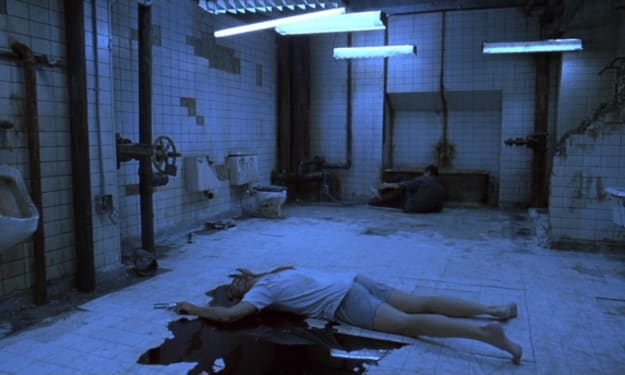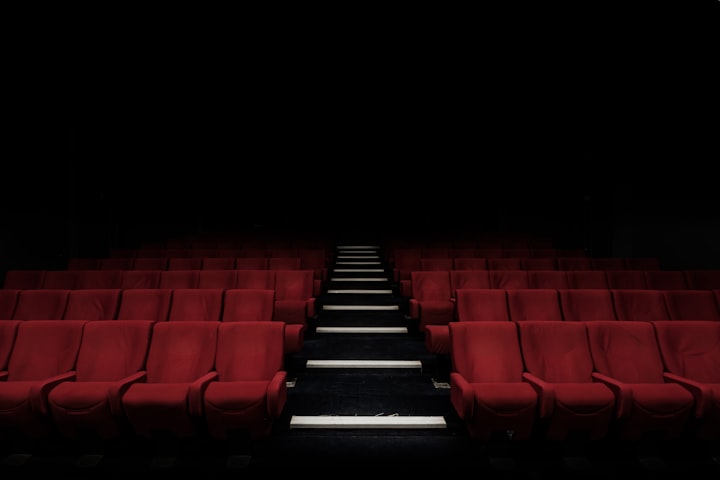The Scariest Thing About Modern Horror Is That It Stigmatizes Disabilities and Mental Illness
Like really, do we have to?

There is really no denying that the "grotesque" has always been an important aspect of the horror genre. In both TV and film, creators have played on our superficiality as a culture. Seeing a deformity or rare disease often makes us uncomfortable, and it can amplify up the creep factor if utilized properly.
The question has become: what exactly is using these things properly?
I recently was reminded of this when American Horror Story creator Ryan Murphy's debuted Scream Queens and ruffled quite a few feathers with its utilization of a man with a rare genetic disorder, neurofibromatosis type 1. This condition affects over two million people around the world, by causing tumors to grow throughout the body.
After the episode "Warts and All" aired, responses from people dealing with Neurofibromatosis hit the internet. One man with the condition went far enough to create a petition on Change.org, calling for Fox to remove the Scream Queens episode, as he felt it victimized individuals actually suffering from the condition. Another woman, who has a son with Neurofibromatosis, pressured Fox to remove the episode as well, saying it was insensitive and could cause pain to those who are suffering.
Essentially, they were saying that a real-life medical condition shouldn't be depicted as an American horror story.
Does The Same Go For Mental Illness?
This subject has definitely been on fire, and also came up in 2016, with concerns of further stigmatization of mental illness—October 10th is World Mental Health Day—as well as physical abnormalities, disorders and handicaps.
In 2016, the "Knotts Scary Farm" takeover of the California-based theme park, Knotts Berry Farm, a virtual reality haunted house, was shut down over criticisms and concerns over offending those struggling with mental illness. The "Fear VR: 5150" haunted house was heavily criticized by patrons (including Pastor Rick Warren) as they claimed the event was disrespectful, mocking and insensitive to the individuals and families of those in such crisis. (After all, "5150" is the code for an involuntary psychiatric hold in the US).
So what is the problem? Well, many critics have continuously stated the facts about the stigma in our culture around mental illness—and the entertainment industry has never seemed to stop itself from exploiting that.
Has The Horror Genre Instilled A Subliminal Fear?
The question of whether or not the horror genre (or the entertainment industry as a whole) utilizes physical handicaps and mental illness to its advantage is hardly up for debate; there really isn't a way to blatantly deny it at this point. Throughout movie history, we have seen I-don't-know-how-many horror films about escaped mental patients or mentally incapacitated killers. Two of the most famous horror icons, Michael Myers and Leatherface, fit those descriptions. As a result, there has been a sort of subliminal fear instilled in us surrounding the issues of mental illness and mental/physical handicaps.
Are People Overreacting? Where's The Balance?
Even with that said, it can also leave you to wonder if people really are just overreacting and taking being offended too far. This argument could be countered by the sheer fact that not every depiction of mental illness and/or handicaps has been portrayed in a negative light. It could even be said that the initial depictions of the classic horror villains didn't necessarily portray them by a disease or illness, but simply by the fact that they were evil.
For example, even though Michael Myers was technically an escaped patient from a mental facility, he was described by his own psychiatrist as evil in its purest form—perhaps even the Devil himself. No matter how many times Myers was shot, he stood right back up and kept walking after you. Mental illness aside, that is quite a terrifying concept to wrap your head around.
When Have The Portrayals Been Done Fairly?
When looking at examples specific to television, the Scream Queens controversy is surprising in a way because creator Ryan Murphy has actually built somewhat of a rapport for respectfully casting and utilizing actors with disabilities. Not to mention he has written a number of characters with disabilities and mental illness, and executed them without causing such an uproar.
American Horror Story, for example, has become well-known throughout its five existing seasons for not portraying characters with mental and physical disabilities for shock effect— but the show has employed several disabled actors. Perhaps the most fitting example of this is the casting of an actress named Jamie Brewer, who has Down Syndrome but wasn't utilized in a disrespectful or typical way.
We first saw Brewer on Season 1 (a.k.a., Murder House) of AHS as the disabled daughter of the Harmons' neighbor, Constance. Despite the unfortunate demise of Brewer's character, she had a solid supporting role, and her portrayal of the young character was both heartbreaking and endearing.
You don't see a lot of actors with Down Syndrome in Hollywood and when you do, they're not usually held in the spotlight. However, what Jamie Brewer has done throughout her three seasons on AHS has been nothing short of remarkable. It's also proof that Hollywood is capable of utilizing those with disabilities in a more positive light. Not only that, but the characters they play can be important characters.
While on the subject of American Horror Story, perhaps the most prominent usage of those with disabilities and physical abnormalities came with its fourth season, Freak Show. While most people would say, "well, duh" regarding the usage of these characters in a theme surrounding a traveling freak show, the most important aspect is how the characters were portrayed.
Within the freak show we had a fortune teller, a three-breasted intersexed person, a bearded woman, two "pinheads," an Amazon woman, the smallest woman in the world, and a young man with ectrodactyly (a.k.a., cleft or "lobster" hands).
What Freak Show actually did wasn't just deliver a creepy season of a horror anthology series; it shined light on the stereotypes and opportunities that those with disabilities miss out on just because they are different. Although "normal" actors were cast in some of the "freak" roles (to use the show's terminology), Ryan Murphy did manage to find actors with actual conditions to portray these roles. These actors include Rose Siggins, Erika Ervin, Mat Fraser, the late Ben Woolfe, and the world's smallest woman, Jyoti Amge. These people were phenomenal in this season, and it just showed more evidence that they do have a place in Hollywood.
Final Thoughts?
Whether Hollywood is under-using, or disrespectfully using, actors with disabilities (or disrespectfully using the conditions themselves) is, like everything else, a matter of personal opinion. What is offensive to one person can be viewed as harmless entertainment by someone else. That's just the way life is.
However, for me personally, I do feel that there is a lot of room for growth regarding these issues. There is no denying the stigmas that Hollywood has either created or perpetuated with its continued simplistic depictions of mental illness, disabilities or diseases.
The bottom line is, these aren't things we should teach future generations to fear, and these aren't people we should teach future generations to fear. That may challenge horror creators to be more, well, creative—it would cause a shift within the horror genre and the entertainment industry overall—but I'm not sure that is a change I would be upset about.
About the Creator
Jenika Enoch
I love movies, music, sci-fi, and art. I'm a certified graphic designer and create my own art. Things that fuel me include equality, respect, and anything weird.






Comments
There are no comments for this story
Be the first to respond and start the conversation.